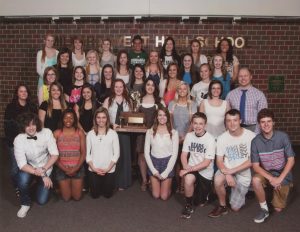Growing up gifted
Honors programs are breeding imposter syndrome in teens
A study from the National Association for Gifted Children found that around half of gifted children will “level out” and perform at grade level by the time they reach high school. As students get older and school becomes more difficult, it’s natural to stop progressing at high rates. For students who have been labeled gifted at an early age, however, this leveling out can make them feel like they are an academic fraud.
March 10, 2021
When I was entering fourth grade, there were two classes students could be placed in: gifted and non-gifted. The teachers and administrators never made the distinction out loud, but the students knew there was a difference, and they knew which teachers taught which group. As a third-grader, getting into the gifted class became my main goal. When I was told that I had made it, I was thrilled (and a little smug).
I have stayed on the gifted track throughout my school career. In fifth grade, I aced the test to join Nebraska’s High Ability Learners program. When it came time for high school registration, I didn’t hesitate to sign up for honors and AP classes. As a “gifted student,” I was encouraged to take any opportunity I could to challenge myself.
Little did I know that being labeled a gifted student would impact my relationship with my education — and with myself. My third-grade self had no doubt that she deserved a spot in the gifted class. By the time I got to high school, the gifted and talented program had fractured much of that confidence. While other students in my advanced classes breezed through math worksheets and raised their hands to answer questions without hesitation, I sat there wondering how I had made it there.
I was one of around 3.2 million students enrolled in a gifted and talented program in the U.S. Most of these programs start in elementary school and identify children who learn quicker or read above grade level. Gifted students may be given alternate assignments or grouped with students of similar abilities. Their intended purpose is to help students dive deeper into material or go at a quicker pace in a public education system that standardizes learning regardless of ability. However, for all that gifted programs accomplish, they fail at helping students build self-confidence.
When students have excessively high expectations of themselves combined with low self-worth, the result is often imposter syndrome. Imposter syndrome, defined by Harvard Business Review as “a collection of feelings of inadequacy that persist despite evident success,” shows up as a fear of being exposed as a fraud or feeling like your success won’t last. It is the result not of humility but of insecurity. People with imposter syndrome often write off their achievements as luck or timing and ignore their hard work and talent, even when others praise them for it.
Because gifted programs are based on the illusion of a student’s potential, gifted children feel like imposters anytime they fall short of what they “could have been,” even if they’ve come extremely far. As a result, a syndrome common among well-known professionals (like poet Maya Angelou and comedian Tina Fey) is also common among high-achieving students. A recent study from Brigham Young University suggests that around 20% of college students in elite programs experience imposter syndrome.
Imposter syndrome in high-achieving students stems from the environment of extreme competitiveness and perfectionism in honors programs. When I was in gifted programs, the fact that I had made it in wasn’t enough. Now I was surrounded by other students who were just as smart, capable and motivated as I was, if not more so, which meant the bar was higher. These feelings were amplified by the push for all gifted students to be the very best and to know everything. Being told that we were the smartest in school and the top of the class was starting to backfire; any wrong answer or low grade felt like a puncture in the image of being a “smart kid” and proof that I was an imposter.
Another way that honors programs breed imposter syndrome is by conditioning students to think that struggling is a sign of weakness. Minor mistakes have you questioning your own competence. Even with years of 4.0 GPAs, high scores on math tests or well-written essays, one bad grade can send you spiraling and thinking you don’t deserve the “gifted” label. My first AP class in high school was understandably difficult — it was the first quarter of my freshman year, and I was taking my first college-level course. In my mind, however, fresh out of the middle school HAL program, the fact that I couldn’t get an A on every single test I took in the class was proof that I wasn’t as smart as people believed me to be. I had been told that not needing help and not having to study were signs that I was gifted, so when I got to high school and was faced with academic challenges, it felt like an affront to my identity.
There is a way for former gifted students to rectify their imposter syndrome. For me, I’ve had to untangle my identity from my label as a gifted student. I’ve had to stop focusing on reaching the top of an invisible ladder of success and start prioritizing my education over my reputation. I’ve had to try to undo years of social conditioning that told me it was wrong to accept compliments or feel proud of my achievements, especially as a woman. What was even more difficult than that was to recognize that luck and, more than anything, privilege were factors in getting to where I am, but that doesn’t negate the hard work I put in to get here. For students dealing with imposter syndrome, finding a balance between confidence and humility is key.
The only way to really confront this phenomenon is to change the way we view gifted students in the first place. Separating children into two groups and telling one group that they are better than the other because they do better with traditional measures of academic success is bound to fail. While programs that acknowledge that students learn in different ways and at different paces are important, recognizing students who are naturally gifted in academics is not enough. Gifted and talented programs should apply the popular “growth vs fixed mindset” education theory to gifted students by teaching them that their own intelligence is not fixed. School will become more challenging over time for even the most gifted students. By teaching that struggling is a chance for improvement rather than a sign of being ungifted, gifted programs can help students avoid falling into the grips of imposter syndrome.








